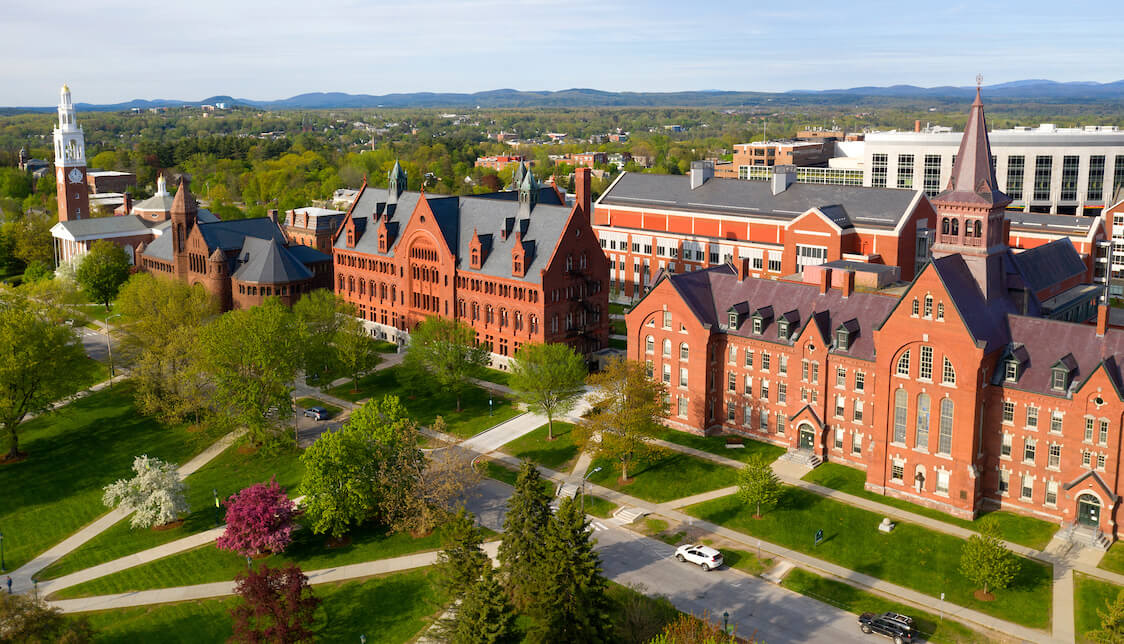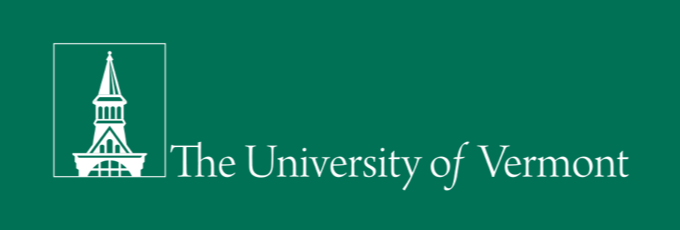At the University of Vermont, researchers are focusing on what matters. Here, in Burlington, Vermont, surrounded by majestic vistas, some of the brightest minds in the world are harnessing the power of research to achieve no small feat: improving the health of our environment and our societies. They are striving for sustainable solutions with local, national, and global applications and impact.
Part of UVM’s success lies in its cross-disciplinary research and collaboration made possible by a public research university of its size and scale. At the Larner College of Medicine, an innovative research model is shedding light on immune response in dengue infection, with the potential of saving hundreds of millions of lives per year. Another breakthrough is fast-tracking promising discoveries in the fight against cancer.
Over at the College of Education and Social Services (CESS), PhD students are unleashing human potential and in the process of making education accessible to people of all abilities.
To create a better future for all will take the entire might of nations and individuals working together. UVM has the unique strengths to lead this charge. Below are four stories that offer a window on a sliver of the work that UVM is doing to create new knowledge and build new practices to help societies thrive today and for generations to come.
What happens when grit is paired with opportunities

Hans Cabra
Hans Cabra, a Fulbright Scholar from Bogotá, Colombia, knows what true courage is. The PhD in Educational Leadership and Policy Studies candidate grew up with a mother who only completed elementary school and a father who barely made it beyond middle school. Where other marginalised children from impoverished backgrounds don’t see a way out of the trap, he dared to dream. He applied for a scholarship to Norway and got it.
“Education gave me an opportunity to escape poverty and ignited a passion for helping young people to pursue their dreams,” he shares. As a PhD scholar at UVM, he’s doing just that.
Cabra is pursuing research on after-school programmes and how to cultivate grit and perseverance. “I believe that grit is the main ingredient in achieving success, but it has to be paired with the right opportunities,” he explains. “These opportunities completely changed my life and the lives of my family members. I want to bring this transformative power of education to all the kids in my community and in my country.”
Access for all abilities
Sefakor Komabu-Pomeyie grew up in a village in Ghana, marginalised because of her disability and gender. When she was eight years old, she was diagnosed with polio after being administered an expired vaccination. The virus left her unable to walk on her own. Stigma followed.

Sefakor Grateful Komabu-Pomeyie
The power of education helped Komabu-Pomeyie beat the odds of life. In 2011, she was selected as a Ford International Education Fellow, which enabled her to come to Vermont and earn a master’s degree in sustainable development, with a concentration in policy analysis and advocacy, from the School for International Training.
Komabu-Pomeyie then took her education to new heights by earning a PhD in Educational Leadership and Policy Studies. She is also building an accessible and inclusive school in Ghana for students of all abilities. The odds may have been stacked against her, but armed with a UVM degree, she’s ready to take her seat at the policy table when she returns to Ghana.
Recently, for her work as an education and disabilities advocate, she was honoured with the prestigious International Service Award from the Association of University Centres on Disabilities at a ceremony in Washington, DC.
“It’s a life-changing moment. It’s a huge award. It means the work I have been doing from my village has been recognised internationally,” she says, adding her gratitude for UVM professor Maria Mercedes Avila, PhD, for nominating her for the award.
Saving hundreds of millions of lives
The Aedes mosquito-borne dengue virus is a pathogen that plagues the tropical regions of the world. In 2019, it caused a record number of over 400 million cases. Its effects range from asymptomatic to severe diseases — many times, it can be fatal.
Vaccines have been hard to develop, as there are four strains to protect equally against. Only one vaccine, Dengvaxia, has been approved for a subset of at-risk individuals in endemic areas.
A study by UVM is offering hope. Led by Associate Professor of Microbiology and Molecular Genetics Sean Diehl, PhD, in collaboration with recent Cellular, Molecular and Biomedical Sciences Program doctoral degree recipient Huy Tu, Ph.D., and colleagues, it set out to determine biomarker candidates and predictors for clinical and immunological responses resulting from dengue infection.

Associate Professor of Microbiology and Molecular Genetics Sean Diehl (left) with former doctoral student Huy Tu, Ph.D.
“These data offer new potential biomarkers for characterising dengue virus infection and novel pathways that could be leveraged to combat viral replication,” explains Diehl. “Our results also gave us some clues about how we might be able to boost protective immune responses, which is the goal of developing effective vaccines.”
Diehl adds that for some of the genes identified in this study, little is known about their role in the response against dengue virus. “This is very exciting, because it could lead to new ways to fight dengue, so we are now investigating these in the lab,” shares Diehl.
A potential target for new cancer treatments
For two decades, UVM Cancer Centre researcher Jason Stumpff, PhD, associate professor of molecular physiology and biophysics, has studied how cells divide and how mistakes in this process contribute to diseases, such as cancer. Every killer has a weak spot, and Stumpff’s latest work has unearthed a vulnerability that could be a potential target for interrupting cancer cell growth.
Stumpff’s recent work focuses on the role of a protein called KIF18A in driving cell division. In these new studies, his lab found that cancer cells are more dependent on KIF18A for growth than normal cells. Target KIF18A and it may be possible to stem or stop cancer.
This promising discovery was made possible by UVM’s wide-ranging collaboration with national and international partners. Stumpff’s findings mark a milestone in a long research journey that began with support from an American Cancer Society Institutional Research Grant pilot award, and then led to Susan G. Komen and National Institutes of Health funding.
Carolyn Marquis, a research technician currently working in Stumpff’s lab, participated in this work as part of her UVM undergraduate Honors thesis.
Follow UVM’s College of Education and Social Services (CESS) on Facebook, Twitter, Instagram and Youtube











